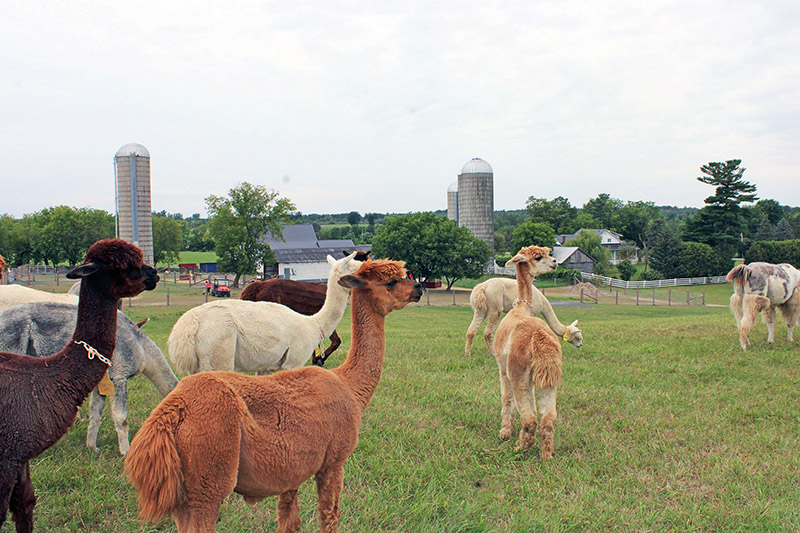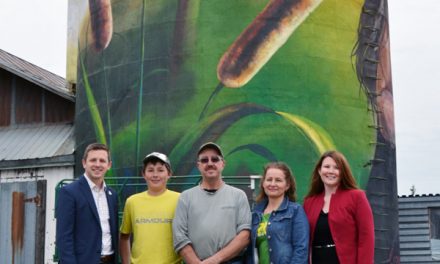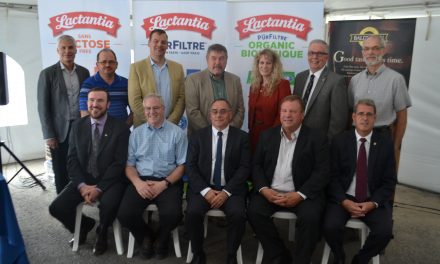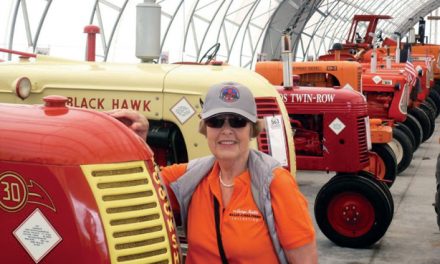From the top of the natural hills on the farm, one is able to get a beautiful view of the farm with its rolling hills. Thompson Goddard Photo
Recently Glen and Lynda Finbow purchased 130 acres in South Glengarry and began operating “Split Rock Farms Alpacas” on County Road 25 near Apple Hill. Lynda and Glen are holding a grand opening at the farm on Wed., Sept. 15, and are looking forward to meeting visitors, discussing their upcoming plans and providing information on the alpaca.
The Finbows have 18 years experience raising alpacas. In fact, Glen is an AOA (Alpaca Owner’s Association) Certified Judge, which allows him to go anywhere in the world to judge an alpaca show. He also authored the book “The Alpaca Breeder’s Terminology Sourcebook” several years ago to help newcomers in the alpaca business become more easily assimilated. Lynda was a paralegal and interior decorator in her old life. In her new life, she mostly manages The Alpaca Habit Boutique and, along with Glen, takes care of the day-to-day care and needs of their 90 alpacas and one llama named “Daisy Duke”. Daisy is a guard llama, because she is twice as big as the average alpaca and more brazen, she and their guard dogs are tasked with protecting the herd from predators.
During the tour of the farm, Glen explained the alpaca is a “very intelligent animal” and a member of camelid family which also includes the single and double humped camel, llamas, guanaco and vicuna, with the alpaca raised primarily for its fleece. He continued that the alpaca “is one of the first livestock in the world, having arrived thousands of years before horses, cows, goats”.
Originating in Peru, Bolivia and Chile, there are approximately 5 million alpacas throughout those countries, with the United States and Canada being home to 350,000 and 35,000 of these animals respectively.
He continued the male and females of the species are separately housed within fenced in enclosures to prevent unregulated breeding, which allows “the farm owner to breed the specific qualities in a future animal that he/she seeks and to improve the general quality of the whole herd.” It is important to know the parentage of the cria, or baby alpaca, so that the animal can be registered by the government and “is also able to be shown in alpaca shows”. Glen continued this will ensure “when an animal is sold, the owner cannot claim the alpaca is from any other bloodline other than what is shown on his/her certificate,” as “some animals are worth far more than others when purchased due to their bloodlines”. There are 28 recognized colours of alpacas, which Lynda explained is more than any other living animal today before mentioning “there are many variances within each colour range as well.”
In the outside pasture areas, the Finbows have created hills of ground in each enclosure “providing “climbing spaces for the animals” whose original homes in South America were hilly and mountainous. Glen explained “these hills allow their alpacas to play “King of the Mountain” games and to preen in front of all the others as if to say “Hey, look at me. I’m the best”. It is quite a sight to watch as they attempt to claim ownership of the top of the man-made hill or in the female alpaca enclosure see them run up and down the sloping hill.
Lynda explained the alpacas are shorn once a year, generally in May, by an expert shearer, noting in warmer climates it could be twice yearly. The fleece is then skirted, sorted and bagged before being sent to a mill to be made into yarn. The process continues with Lynda sending the yarn off to either expert knitters or crocheters to create many of the products which are sold onsite in The Alpaca Habit Boutique, and the general knitting public is able to purchase the remaining yarn.
Managed by Lynda, the boutique will feature items such as socks, hats, mittens, scarves, sweaters, children’s toys, pet toys, blankets and “various felt products made from alpaca fleece. She continued that the tags of items made by Split Rock Farms Alpacas are the “names of the animals whose fleece was used to create that particular item, providing the purchaser with a closer connection to the animals who donated their fleece and “knowing that animal is just outside the boutique door. She commented that half of the products which will be sold in the boutique are created from yarn produced from their alpacas, “with the other half sourced from respected alpaca vendors who sell items in many other countries.”
While describing the longevity of clothing made from alpaca fleece, she explained ancient South American royalty had worn clothing made from this fleece which appeared to have not deteriorated greatly when archaeologists excavated grave-sites centuries later, with Glen mentioning in those countries Alpaca is called the “clothing of the Gods”. Lynda continued, there are many benefits to clothing made from alpaca fleece. She described how it contains no lanolin, is hypoallergenic, “is resistant to bedbugs and bed mites, dries quicker than most other fibres when laundered, is extremely strong and is much warmer than wool or other fleece fibres” to name just a few of its qualities, with Lynda commenting how “It is just wonderful stuff”.
Lynda explained The Alpaca Habit Boutique will be open after the grand opening on September 15 “Thursday through Sunday between 11 a.m. and 4 p.m. each week.” She continued people will be able to book “tours at that time, as well, when guests will be able to get up close and personal with the alpacas and tour the farm, as well as experience at the store the myriad of items available from alpacas”.
Be sure to visit their website, located at splitrockfarmsbb.com or Facebook page for more information in the coming months as there are several plans in the works.













